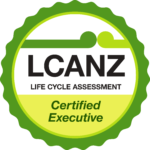CLE Overview
Suitably qualified and registered LCANZ members are able to become certified as Certified Life Cycle Executives (CLEs).
The Certified Life Cycle Executive (CLE) certification:
- Adds credibility whatever your role in an organisation.
- Recognises the competency of professionals working in project, program or business management roles to interpret and communicate LCA results.
- Ensures professionals understand core principles of LCA methodology so they can inform on product design, organisational decision making,and marketing, without succumbing to greenwashing.
The CLE certification was developed in conformity with the ISO 17024 standard and is especially useful for individuals such as architects and product specifiers, purchasing agents, environmental managers, sustainability managers, educators and individuals who contract and use LCA studies.
CLE demonstrates competency in:
- Interpreting and communicating results
- Which are more ‘Confident’ results
- Which have higher uncertainty
- Understanding some nuances in LCA
- Data sources
- Data quality
- The critical review process – what a peer reviewed study is and isn’t
- Sustantiating environmental claims
- Support external marketing – while avoiding greenwashing
- Understanding nuances of various calculation tools – free and commercial
CLE Certification is offered under an arrangement with the American Centre for Life Cycle Assessment (ACLCA). Candidates who meet the Exam Prerequisites, as prescribed in the ACLCA website, and who successfully complete the examination will be certified as CLEs. The certification is recognised in New Zealand, Australia, and the USA.
CLE Exam Prerequisites
Prerequisites for the CLE are:
- Masters or post-graduate degree and two or more years working extensively on environmental sustainability or related initiatives OR an undergraduate degree and four or more years working extensively on environmental sustainability or related initiatives.
- LCANZ membership (individual or organizational membership)
ALL SUBMITTED MATERIALS ARE KEPT CONFIDENTIAL. Submission of all materials verifying the prerequisites must be completed no later than one month before the planned exam date.
About the Exam
The CLE exam is a closed book 1-hour multiple choice exam in English. There are 100 questions. The exam covers General LCA knowledge, Project management, Data quality management, Statistics, Ethics, and Emerging Issues. Check out the Exam Topics section for a full list of contents.
Exam Process and Location
The CLE exam can be taken from anywhere in the world at your convenience.
The overall procedure for the exam is as follows:
- Review prerequisites for CLE Exam
- Contact membership@lcanz.org.nz to register interest
- Submit application with proof of prerequisites
- Pay the Exam fee to ACLCA
- ACLCA will email the person (cc LCANZ) with details on setting up the date/time of the exam. A request will be made to include a photo that will be used to ‘match’ them in the online proctoring program.
- ACLCA will create an account and set the exam in system.
- Confirmation will be sent to the person along with a calendar reminder.
- On day of exam, person will sign in and take the exam
Maintaining CLE Certification
CLE Certification is maintained for as long as the CLE is an LCANZ, ALCAS, or ACLCA member in good standing.

